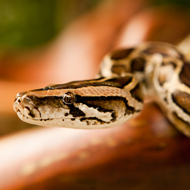
Pythons travel up to 22 miles to "home" location during experiment
An experiment has found that Burmese pythons display signs of map and compass senses, allowing them to travel for months to reach a location.
The study by researchers in Florida, for the first time, provides evidence that snakes may share the same compass senses as other species such as sea turtles and pigeons.
The research team took six snakes and relocated them 13 to 22 miles from where they were captured.
"All animals were placed in sealed, opaque plastic containers and were transported by vehicle to release locations (paths taken by researchers were bit direct.
"Snakes were anathematised during implantation surgeries. We radio tracked each python one to three times per week and recorded locations using a GPS from a fixed wing aircraft," said lead author Shannon Pittman in the paper published in The Royal Society journal Biology Letters.
Five of the six snakes reached within three miles of their capture locations while the sixth was moving in the right direction.
"This study provides evidence that Burmese pythons have navigational maps and compass senses .
"In addition, snakes maintained orientated movement over relatively long time scales (94-296 days), demonstrating the maintenance of long-term movement goals and high motivation to reach home locations," the study said.



 The Veterinary Medicines Directorate (VMD) is inviting applications from veterinary students to attend a one-week extramural studies (EMS) placement in July 2026.
The Veterinary Medicines Directorate (VMD) is inviting applications from veterinary students to attend a one-week extramural studies (EMS) placement in July 2026.